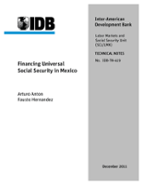Financing Universal Social Security in Mexico
Date
Sep 2011
The proposal by Levy (2008) whereby a universal social insurance (USI) scheme is guaranteed to all workers, regardless of formality status, aims at abolishing the current contributory social insurance system and financing social insurance through value-added taxes instead (henceforth, the social security reform). We argue that this is a major reform as it breaks down the duality present in social insurance policy in Mexico and other Latin American countries and put an end to both informality and the truncated welfare state problem, in the sense that all workers would be covered by the same regulations with regard to social insurance. The model is calibrated for the Mexican economy, as this country is characterized by a large informal sector, high rates of tax evasion, and a knotty tax system, including differentiated rates on value-added taxes. In particular, we estimate the hypothetical cost of such scheme for 2008 as well as the extra revenues generated after imposing a uniform VAT rate of 16 percent. These calculations are based on a static general equilibrium model, which takes into account the change in firms¿ behavior in a tax evasion framework. The results suggest that the USI scheme is financially viable, even after taking into account a compensatory transfer to poor households as a result of the VAT increase. In addition, real wages in the formal sector might increase by 15 percent as a result of USI. This number should be interpreted as an upper bound estimate, given that the model assumes an inelastic labor supply.



